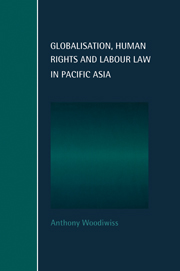Book contents
- Frontmatter
- Contents
- List of figures
- Acknowledgements
- CONVENTIONS
- Introduction: the ‘clash of civilisations’ and the problem of human rights
- PART ONE Against absolutism and relativism: towards a globally enforceable concept of human rights
- PART TWO Human rights, labour law and patriarchalism in Pacific Asia
- Conclusion
- Notes
- References
- Index
Conclusion
Published online by Cambridge University Press: 07 May 2010
- Frontmatter
- Contents
- List of figures
- Acknowledgements
- CONVENTIONS
- Introduction: the ‘clash of civilisations’ and the problem of human rights
- PART ONE Against absolutism and relativism: towards a globally enforceable concept of human rights
- PART TWO Human rights, labour law and patriarchalism in Pacific Asia
- Conclusion
- Notes
- References
- Index
Summary
The question guiding this study has been: ‘Is there a fundamental incompatibility between patriarchalism and human rights?’ My answer is ‘No’ and for two main reasons. First, in the absence of the kinship relations that previously legitimated patriarchalist discourses of rule, the latter have to be imbricated with those of liberal democracy and the rule of law as well as their associated institutions and procedures, if they are to be considered as legitimate bases for the exercise of ‘joint right’ by their now subject populations. Second, thanks to Wesley Hohfeld and indeed the bifurcated nature of human rights discourse, there is a way of enunciating rights that validates heteronomous values and institutions over those that validate autonomy, namely by stressing enforceable ‘claims’ and ‘powers’ over ‘liberties’ and ‘immunities’ in their writing and modes of institutionalisation. Moreover, my most general conclusion is that it is possible sociologically to descry an apparently emergent if still seriously flawed neo-patriarchalist human rights regime in Pacific Asia that is specified in just these terms.
In what follows I will make no attempt to summarise the evidence for this conclusion contained in the case studies presented above. Nor will I repeat the analytical specifics that explain the presence, absence or degree of enforcement afforded labour and human rights in the different territories I have discussed. Rather, within the theoretical context outlined in Part I, what I wish to do here is to specify what the case studies can tell us about the more general social-structural conditions that either favour or militate against the establishment and maintenance of respect for labour and human rights in societies which claim to be patriarchalist and represent instances of Pacific capitalism.
- Type
- Chapter
- Information
- Globalisation, Human Rights and Labour Law in Pacific Asia , pp. 244 - 264Publisher: Cambridge University PressPrint publication year: 1998



